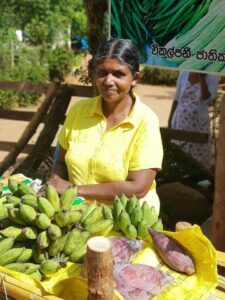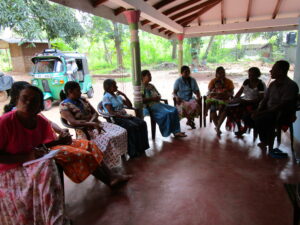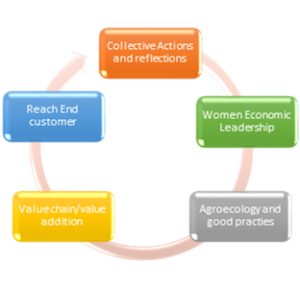Vikalpini, a women’s network in Sri Lanka, through a continuous community engaging process, empowered women, socially and economically, thus reducing their vulnerabilities. The collective experiences and individual cases highlight that women farmers
can collectively handle and take control of every aspect of production, marketing and value chain to maximize benefits.
Monaragala is situated about 170 kilometers east of the capital city of Colombo in Uva province in Srilanka. Monaragala is a multi-ethnic region with high poverty levels. The main occupation of the community in Monaragala is agriculture, following the traditional slash and burn system since generations.
Most of the farmlands are rainfed with supportive irrigation from small local non- perennial streams. In the dry season, most of the streams get dried up and farmers have to depend on the irrigation water distributed through small ponds. Most of the farmers often face difficulties in farming due the lack of rain and long droughts.

Damayanthi of Niyedalla women’s group in Monaragala, selling her organic harvest at the farmers’ market
Further, Monaragala is also known as one of the areas where foreign private companies, like Booker and Dole Lanka, started massive contractual farming projects, marginalising the local people. In 1986, an American company called, Booker came in to an agreement with Sri Lankan government and started a massive sugar cane plantation project in some of the areas in Monaragala Districts (Pelwatta, Sewanagala). Farmers lands were grabbed despite the people’s resistance and farmers had to become labourers in their own lands. Farmers were not allowed to cultivate any other crop other than sugar cane. They were allocated 4 acres of lands to cultivate sugar cane and ½ acres of lands to settle.
Livelihoods and lifestyle associated with traditional cultivation practices changed with the introduction of sugarcane. Exposed to high levels of pesticides and other agrochemicals in the sugarcane farmlands, farmers started facing numerous health issues. Owing to high costs of production, farmers are in debt. Also, the income from monocropping farming has gradually reduced, making farmers economically vulnerable. Their vulnerability has further increased due to the recent economic crisis, as well. The economic crisis has exaggerated the poverty issue. The self-sufficient food system at household has gradually collapsed due to high prevalence of commercial farming and monocropping. Farmers, especially women, became labourers on these commercial farms. With the collapse of self sufficient food systems, today, many children are facing nutritional deficiencies.
Resisting massive commercialisation of farming, Vikalpani, a women’s federation, started promoting agroecology since the 1990’s. It worked with the women in Monaragala districts by facilitating diverse training programs on agroecology. All these women meet once a month in their village level group meetings. They discuss the work done and plan future action. They started their own savings and credit system, to meet their financial needs and save themselves from falling into microfinance debt traps, led by private companies. Also, these women are politically aware and active, leading political discussions as well as campaigns.
By 2016, 50 women farmers under 5 sub-groups got trained on agroecology on aspects like pest management, land preparation, organic input preparation, crop management and post harvest management. Today, Vikalapani has around 100 women members who are organised into 11 sub groups. Some of women have emerged as Trainers in the communities, promoting agroecology with others.
|
Box 1 Historically speaking… The people in Monaragala district were colonized for agricultural purpose in 1948 under the agricultural colonization program which was led by former agriculture minister D.S. Senanayake. Under this project, landless people were invited to move to Moaragala district and they were distributed 5 acres of upland and 3 acres of mud land for cultivation. The lands were cleared by the government and distributed with a house to settle. Many unemployed youths came to the area and settled with agriculture as their main occupation. The purpose of this agricultural colonization program was to enhance the effective use of forest land for food production and involve the unemployment communities particularly youth in agriculture. |
PLDP process – the beginnings
Vikalapani became part of the RLEP program in 2018. They even hosted one of the PLD workshops in Sri Lanka in 2018. The leaders of the Vikalpani participated in this workshop and were exposed to the PLD process. With the interest in PLD being ignited, the staff members and community leaders participated actively in the workshops conducted in Indonesia, Nepal and Philippines. After Vikalapni become a partner of APEX platform, they learnt more about the PLD process while knowing each other’s experiences. Those who directly participated in these workshops shared their knowledge at ground level with women farmers in their group meetings.
Believing that PLD is a sustainable approach in finding solutions for diverse ground level community issues, it took it up with further vigour for collective decision making. The process involved mapping issues, looking at origin of issues, analyzing available resources, and potential collective solutions. Earlier, while the community engagement practices were primarily joint discussions and collective decisions, PLD’s Participatory Action Research (PAR) involving Action-Reflection-Action helped in addressing issues at ground level. The process was further strengthened through exchange visits, rigorous discussions on contentious issues, inspecting and observing each other’s farmlands, learning from each other’s experiences through extensive sharing.
Exploring Markets using PAR
In 2020, Vikalpani conducted a PAR with its members for finding the solutions for their market needs. They were prepared to venture into an area like markets, and challenge the patriarchal market ownership, led by men, traditionally.

Meeting of Sama Mawatha group
The women of Vikalpani have been generally small scale producers, producing mainly for home consumption and may be small surplus for selling. Once the small scale producers found production levels getting bigger, owing to aggregation, they wanted to find markets for selling their products and opportunities for value addition. They wanted to explore collectively. They were interested in improving economically as well as to fulfill their family and children’s needs better.
Women farmers attempted to identify possible markets and supply chains involving value addition. Initially, they analyzed the prevailing situation. They conducted community mapping exercises analyzing the crop choices and land use, histories of the settlements, each other’s roles in agriculture. They used crop calendar to analyse the potential harvesting months. Further in the PAR, they analyzed the potential markets around them, their main suppliers, and possible products that they can produce for marketing. They analyzed each other’s capacities for supplying products. They delved deeply into issues through problem tree analysis. They identified the bottlenecks existing in reaching the market avenues.
They identified following major issues which needed to be addressed – Less knowledge on food processing and value addition; difficulties in getting standard certificates; involvement of intermediaries in marketing; limited information flows of state and other mechanisms; less transportation; and price inflation of raw materials; role of MNCs; less markets for organic products; less finances and equipment; ability in assessing market demand. Then they categorized the issues as those they can find solutions by themselves through collective mechanisms as well as those which they need support from Vikalpani or other institutions They listed the activities that they can initiate and developed collective market proposals.
They further categorized the issues – as those they can find solutions by themselves through collective mechanisms, as well as those which they need support from other institutions or Vikalpani. Historically, women’s role in agriculture has always been identified as a supportive role for men and not as a leading role. They are excluded in accessing markets owing to various factors. They examined how the initiatives could address the patriarchal market ownership, led by men.
As a result, women farmers initiated Farmers’ market, Vikalpani Sales store, Mobile market, Saving groups, Value added food products, ‘seed breeding’ enterprise and organic input production enterprises.
Women’s Collective Initiatives
- The Farmers’ Market: The farmers’ market was one of the successful initiatives of Vikalpani women farmers. They conduct open market, every Friday, in an open space near the public school in Ulugalla grama niladari The women farmers of 102 groups initiated the open market with the participation of 25 vendors. Some of the women act as collectors and collect the produce (eg. vegetables) from the other members and sell in the open market. After selling the collected harvest in the open market, the suppliers are given their share of income. There is a management team in place, which monitors and observes the supply chain and ensures that the only non-chemical produce is brought into the market. At the end of each open market event, the leaders team come together and discuss about how the day went as well as collect new ideas for promoting the open market.
The market was expanded to include other villagers to sell their products. As a result, many women started selling their handicrafts, processed food and other items in the market. The members shared that the incomes went up during those times when villages could not reach out to nearby towns, for example during times of Covid pandemic and the economic crisis.

- Vikalpani sales store: Vikalapni has a small daily sales store in 102 junctions, operating on a daily basis. The members of the Vikalapni bring their products to this store and sell them to the villagers. Kususm Disanayeka who is the founding member of Vikalpani who took leadership in the PLD discussions on market development, is presently eading the Vikalpani Sales store. She gains around 3000 rupees of income per day.
- Value addition: In the market development discussions, one of the aspects was value-added production process. This was started by women enterpreneurs who took leadership and the raw materials supply was ensured by Vikalpani members.
- Seed production: Post PLD discussions, one of the groups developed a proposal on seed breading enterprise and ventured into seed production. The government agricultural officers trained women in seed breeding. A collective seed breeding enterprise was started recently, involving 23 woman farmers. Currently, they are in the stage of planting the seeds.
Inspiring cases
- Sama Kumari, 42 years, is a small-scale producer and a member of Sama Mawatha sub group. Earlier, she used to practice chemical intensive conventional agriculture. She has an upland of 3 acres where she cultivates vegetables such as brinjal, banana, long beans, bitter guard, maize, and chilly. She also has one acre of paddy land. She also cultivates Kawupew, Mun and maize as commercial crops. In 2016, she participated in training programs on agroecology. After gaining knowledge, she transformed her farmland into agroecological farm while successfully influencing her husband too. She participated to Vikalpani open market development, discussions as well and decided to bring her products weekly and sell in the open market. She collects the harvest of others as well and walks around 1.5 km from her home to reach the open market. She usually earns Rs 2,000 /- a day. She says, “Turning to engage in agriculture without using chemical fertilizer and pesticide is one of the important decisions that I took in my life. Afterward, I started to supply my extra harvest to the village market and it helped me to manage my household level expenses.”
- Sujeewa Rathanayake, 43 years, is a member of Dilena Tharu group. She has been engaging in Mushroom production successfully, after participating in PLD discussions. She started the mushroom production at her household. Apart from that, she has a group of 30 women who engage in mushroom production under her supervision. She provides mushroom pots to those women and they also engage in the enterprise collectively. She says, “The knowledge and the awareness that I got from participating in the programs helped to restart my own enterprise. I share the knowledge with other women in my area on mushroom production.’’
- Nishanthika, 38 years, is a member of Badalkumbura group. Continuously engaged with Vikalpani from her childhood, Nishanthika, is now a community leader. Based on discussions, she started her own business of processed food production. She gained the knowledge on food processing from the Vidatha Resource Center in Monaragala. Besides, she connected with many government and non-governmental organizations to gain knowledge and resources for adding value to her products. She collects the raw materials for her production from women farmers of Vikalpani, directly. Initially, she collected banana, woodapple, papaya and pineapple from the villagers, prepared Jam and sold it in Monaragala town. Gradually, she ventured into dried food production. Now, she produces banana chips, milk toffee and Casava chips. Apart from that she collects Kithul trickle, ragi and other products from the women farmers and sells in the town. She usually earns 200,000 to 300,000 rupees per month. She has her own production unit and there are around 7 women working with her. Presently, she is a consultant for other women in business development.
Conclusion
Vikalpani recognizes that PLD is a sustainable process empowering communities to find their own solutions, collectively. It identifies certain critical elements which have brought about a transformation in their processes (Fig 1). They include Action-Reflection; Building economic leadership; Putting agroecology into practice; Value addition to produce; Reaching the end customer directly. The collective experiences and individual cases highlight that women farmers can collectively handle and take control of every aspect of production, marketing and value chain to maximize benefits.
As an organisaiton, Vikalpani has experienced a positive change in the way they work. From mere discussions, they have moved on to using facilitation and participatory tools in bringing about the necessary changes. The facilitation skills required for the process have percolated down. Today the women leaders of the sub groups conduct their own PARs to identify solutions and initiate action. The women farmers recognize this approach as a supportive and integral tool for their work at ground level.
Vikalpani strongly believes that PLD is a continuous community engaging process. The Action – Reflection – Action process is a useful tool to address any new realities, even in the future too. Currently, Vikalpani is seeking new opportunities to expand the market initiatives to enhance economic leadership of women farmers in their own contexts.
Source: This article is originally published in “Experiences in People Led Development: Promoting Food Sovereignty and Agroecology in Asia”, September 2023, published by Pesticide Action Network – Asia Pacific (PANAP), Malaysia.
Chathu Sewwandi
Vikalpani
B61, Maligawila, Okkampitiya, Sri Lanka
Email: chathusewwah@gmail.com









